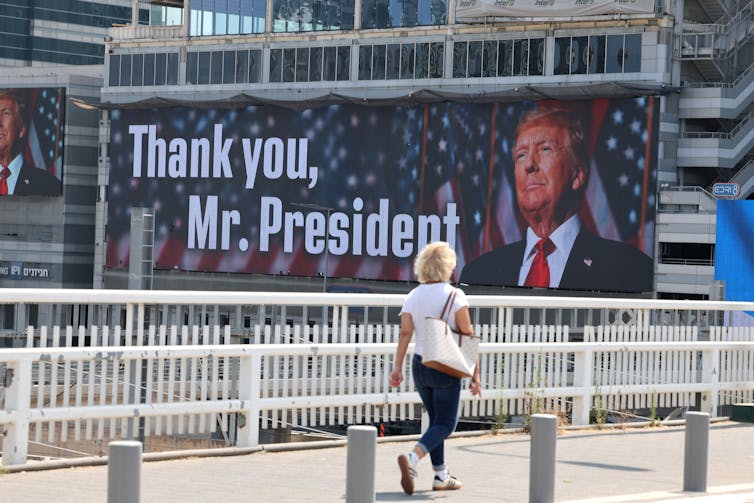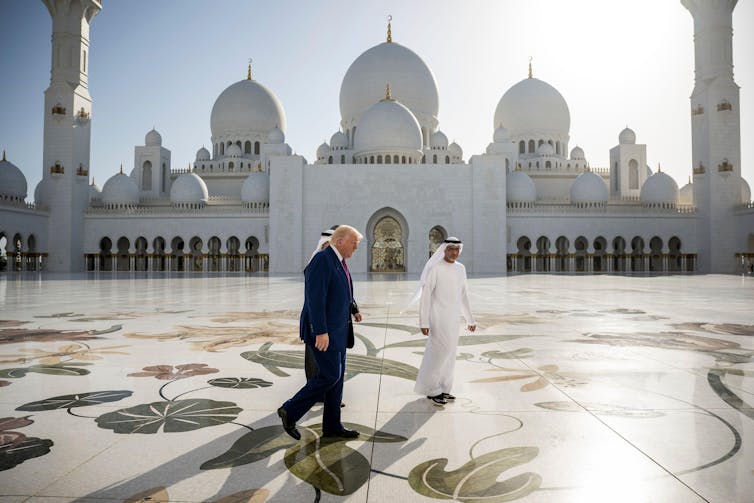On Sunday June 22, Donald Trump announced that several of Iran’s most important nuclear facilities had been “completely obliterated” and that the country’s nuclear weapons programme had been crippled. Iran denied this and vowed to retaliate. The Iranian parliament has already given approval to closing the strait of Hormuz, a vital waterway through which 20% of the world’s oil transits en route to customers all over the world.
Initially the US government insisted that the objective was simply to halt Iran’s nuclear programme. But the Israeli prime minister, Benjamin Netanyahu, has said several times that he wanted to topple Iran’s theocratic regime. And the day after the US bombing raids, Donald Trump also began to talk of regime change in Iran.
We asked Middle East expert Scott Lucas how the situation might develop.
How might this now escalate?
Iran’s leadership has no good military options, just as it has had limited capabilities in the nine days since Israel launched its missile strikes and targeted assassinations across the country. There are reports of a missile attack on the US base at Al Udeid outside Doha in Qatar. Missiles have also reportedly been launched at a base in Iraq housing US troops. The US has a military presence across 19 different sites in the region, including in Bahrain, Egypt, Iraq, Israel, Jordan, Kuwait, Qatar, Saudi Arabia, Syria and the United Arab Emirates, with up to 40,000 US troops. Many of these are within range of Iranian missiles and drones. Iran-backed militias in Iraq could also attack US personnel on bases in the country.
But the Biden administration showed that it would hit these back hard. When the militias in Iraq and the Assad regime’s Syria killed troops and a contractor, Washington pummelled the groups with airstrikes. Iran’s Quds Force, responsible for operations outside the Islamic Republic, told the militias to stop.
Iran could target the US fleet in the Persian Gulf. It has also threatened to close the vital strait of Hormuz. But given that 20% of the world’s oil goes through the waterway, those operations would incur the wrath not only of Washington but of other countries. The Gulf states, whose support Tehran desperately wants and needs, would be angered.
Iran’s allies in Yemen, the Houthi rebels, could renew their attacks on Red Sea shipping. They could fire drones and missiles, reprising their assault on Saudi oil facilities between 2019 and 2022. But the political and military cost of that retaliation would be high.

Sign up to receive our weekly World Affairs Briefing newsletter from The Conversation UK. Every Thursday we’ll bring you expert analysis of the big stories in international relations.
Iranian hybrid attacks, through cyber-warfare and assassination plots, are also a possibility. But the US and other states have clamped down on those activities in recent years with toughened surveillance, enforcement and sanctions on Iran, making their achievement of results more difficult.
So while Iran continues to launch a dwindling stock of missiles at Israel, I think that its strategy beyond that is political. Play the victim and try to encourage other states, including the Gulf countries and the Europeans, to distance themselves from the Trump administration.
What does this tell us about the relationship between Trump and Netanyahu?
Benjamin Netanyahu has played Trump to ensure the success of Israel’s war. It’s as simple as that. As recently as February 4, Trump came close to humiliating the Israeli prime minister when he visited Washington to ask for the administration’s support for strikes on Iran. As Netanyahu sat uncomfortably in the White House press briefing, Trump declared that the US was going to open negotiations with Iran over Tehran’s nuclear programme.

EPA-EFE/Abir Sultan
Netanyahu told the Trump administration in mid-May that it was intending to go ahead with strikes on Iran, even without US approval. There was some manoeuvring over the next three weeks, as the US and Iran went through five sets of talks. But on June 8, Trump met his national security advisors at Camp David in Maryland, where the CIA director John Ratcliffe and chairman of the joint chiefs of staff, General Dan Caine, briefed him on the threat from Iran.
The next day Netanyahu told Trump over the phone that Israel was going ahead with its attacks, which it launched four days later. The US duly cancelled the sixth set of peace talks in Oman. Now Trump, with the Orwellian cry of “NOW IS THE TIME FOR PEACE!”, has blown up those negotiations for the foreseeable future.
Read more:
Why are the US and Israel not on the same page over how to deal with Iran? Expert Q&A
Where are Russia and China in all this?
Both countries are watching closely and calculating their response. On May 22, Beijing condemned “a reckless escalation and a flagrant violation of international law”. But its response will largely be rhetorical, avoiding any military or even political entanglement. If the US deepens its involvement in Iran’s war, including with any further strikes, China will step up the rhetoric while seeking advantage from the instability. It will play the responsible power, pursuing peace and progress, in contrast to a destructive and unreliable Trump administration. That would be a certain diplomatic win for Beijing.
Russia is in a trickier position because of its 40-month full-scale invasion of Ukraine, which has no end in sight. Iran has been an essential part of the military campaign, providing thousands of drones for Moscow’s daily attacks on military and civilian sites. As recently as April, the two countries signed a comprehensive strategic partnership agreement, pledging closer cooperation in trade, defence, energy, and regional infrastructure projects. Iranian foreign minister Abbas Araqchi has flown to Moscow for “serious consultations” with Russian “friends”, including Vladimir Putin.
But Russia’s scope for intervention could be limited. Just before the US attacks the Russian president, Vladimir Putin, said he might mediate between Israel and Iran. Trump immediately slapped him down. And the Kremlin will not want to commit military resources to what might be a prolonged conflict, since it is already stretched – maybe overstretched – in Ukraine both on the battlefield and on the economic front.
What will the Arab world be thinking?
Perhaps the most important reaction to the strikes is coming from the Gulf states, in particularly Saudi Arabia, the UAE and Qatar. Only a few weeks ago Trump was in the Gulf signing deals on trade and arms. But Gulf leaders are rattled by what might be an expanding, destructive conflict with the prospect of a power vacuum in Tehran.

Molly Riley/White House Photo/Alamy Live News
For months, they have manoeuvred against that instability in discussions with the Islamic Republic as well as with Washington. With its open-ended war in Gaza, Israel has already shattered the economic and political prospects of “normalisation” (establishing diplomatic relations and trade partnerships). Now the Gulf states are worried how far Israel and Iran will carry out their confrontation across the Middle East.
There had been hints that they might come off the fence between flattering Trump and pushing back against Washington, and this now appears to have happened – to an extent anyway. Without naming the US, Saudi Arabia “condemned and denounced” the violation of Iran’s sovereignty. Qatar said the US strikes would have “catastrophic repercussions”. The UAE warned all parties to avoid those “serious” repercussions, and Oman went farther by criticising the breaking of international law.
Trump ignored his own intelligence. So who is helping him game out this situation?
That’s a great question with no clear answer. It is clear that it’s not the director of National Intelligence, Tulsi Gabbard, reportedly out of favour because she dared to publicise the assessment of US intelligence agencies that Iran is not pursuing a nuclear weapon. But with other cabinet members all proclaiming that this was Donald Trump’s “brilliant” plan, it is hard to see who led in pushing him away from negotiations and into the strikes.
The defense secretary, Pete Hegseth, is little more than a hyperactive cheerleader. Secretary of State Marco Rubio is balancing between promoting the strikes and urging Iran to return to negotiations. The US vice-president, J.D. Vance, was central last week in efforts to persuade Republican legislators to back the strikes, amid the split in the Trumpist bloc over attacks.
In the end, much of the impetus for this comes from Israel. Netanyahu has been careful to lavish praise on the US president for his “bold decision”, which he said would “change history”. With encouragement from a roll call of his Republican party admirers, Trump appears to have eagerly taken this up as his “victory”, claiming to have achieved “peace through strength”.




